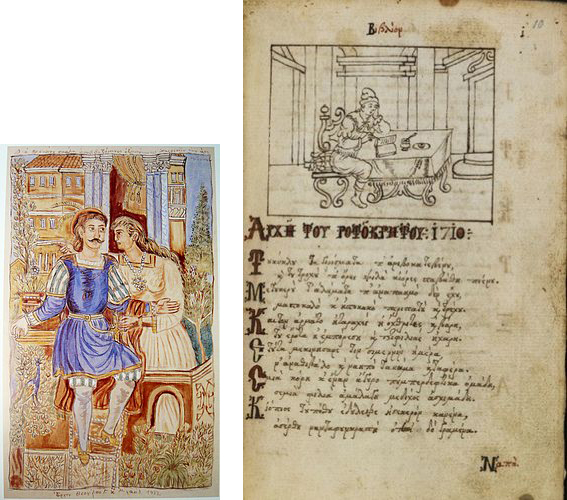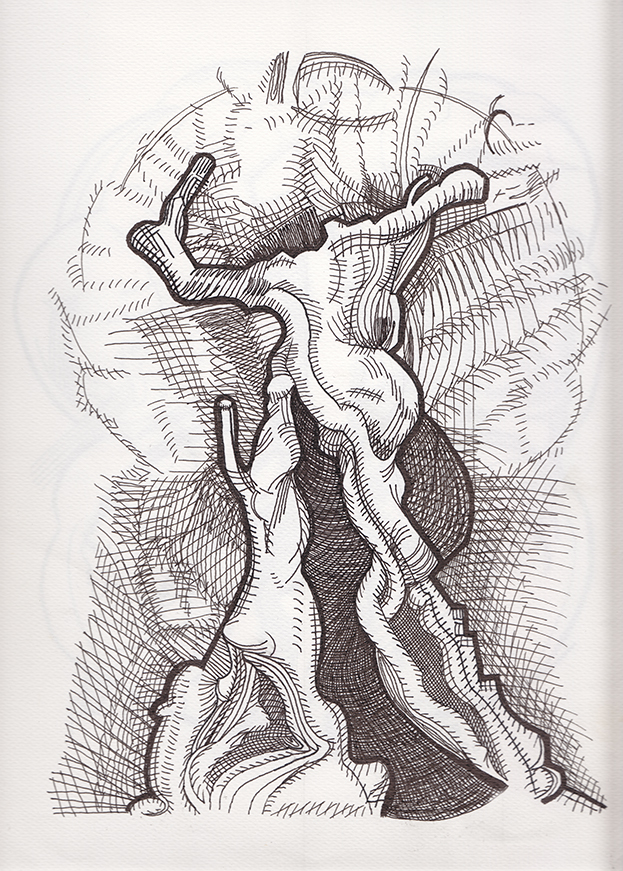
Erotokritos
https://en.wikipedia.org/wiki/Erotokritos
Erotokritos (Greek: Ἐρωτόκριτος) is a romance composed by Vikentios (Vitsentzos, "Vincenzo", Vincent) Kornaros in early 17th century Crete. It consists of 10,012 fifteen-syllable rhymed verses, the last twelve of which refer to the poet himself. It is written in the Cretan dialect of the Greek language. Its central theme is love between Erotokritos (only referred to in the work as Rotokritos or Rokritos) and Aretousa. Around this theme, revolve other themes such as honour, friendship, bravery and courage. Erotokritos and Erophile by Georgios Hortatzis constitute classic examples of Greek Renaissance literature and are considered to be the most important works of Cretan literature. It remains a popular work to this day, largely due to the music that accompanies it when it is publicly recited. A particular type of rhyming used in the traditional mantinades was also the one used in Erotokritos
Plot:
The play takes place in ancient Athens, but the world displayed is a complex construct which does not correspond to any particular historical period. Alongside references to classical Greece there are anachronisms and many elements particular to Western Europe, such as the jousting competition. The work is divided in the following five parts: I. After several years of marriage, a daughter (Aretousa) is born to the King of Athens (Heracles) and his wife. The son of the faithful adviser to the king (Erotokritos) falls in love with the princess. Because he cannot reveal his love, he sings under her window in the evenings. The girl gradually falls in love with the unknown singer. Heracles, when he learns about the singer, organizes an ambush to arrest him, but Erotokritos with his beloved friend kills the soldiers of the king. Erotokritos, realising that his love cannot have a happy ending travels to Chalkida to forget. During his absence, his father falls ill and when Aretousa visits him, she finds in the room of Erotokritos a painting of hers and the lyrics he sang. When he returns, he discovers the absence of his drawing and songs and learns that the only person that visited them was Aretousa. Realizing that his identity was revealed and that he may be at risk, he stays at home pretending to be ill. Aretousa sends him a basket of apples to wish him well and as an indication she shares his feelings. II. The king organizes a jousting competition for the entertainment of his daughter. Many noblemen from around the known world participate and Erotokritos is the winner. III. The couple begins to secretly meet under the window of Aretousa. The girl pleads with Erotokritos to ask her father to allow them to marry. Naturally, the king is angry with the audacity of the young man and has him exiled. Simultaneously a marriage proposal for Arethusa arrives by the king of Byzantium. The girl immediately gets engaged secretly to Erotokritos before he leaves the city. IV. Aretousa refuses to consider any marriage proposals and is imprisoned by the king alongside her faithful nanny. After three years, when the Vlachs besiege Athens, Erotokritos reappears, his true identity concealed through magic. In a battle he saves the life of the king and gets wounded in the process. V. In order to thank the wounded stranger the king offers him his daughter as spouse. Aretousa refuses to accept this marriage and in discussion with the disguised Erotokritos she persists in her refusal. Erotokritos submits her to tests to confirm her faith and finally reveals himself after breaking the spell that concealed his identity. The king accepts the marriage and reconciles with Erotokritos and his father, and Erotokritos ascends to the throne of Athens.

